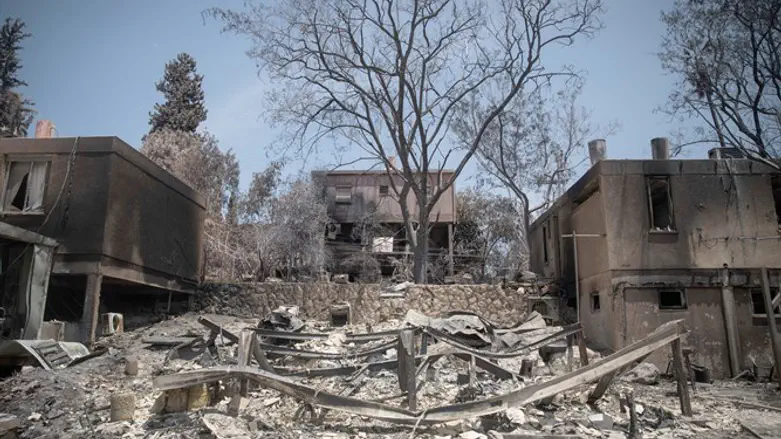
Residents of Moshav Mevo Modi'im, that was burned almost entirely last week, set up a committee to fight for their right to proper housing.
Arutz Sheva spoke to Chaya Gal-Or, a resident of the Moshav, who tells us about the sense of chaos that families have experienced since the tragic event.
Gal-Or tells about her family; her mother, her father, and brother with his wife and three children who found themselves with the other families in a small area allocated to them in Yad Binyamin, a half-hour drive from the Moshav. "My brother, his wife and the three children are in one room in bunk beds. There's no room to move. Everyone's traumatized. There's a bomb shelter clubhouse here and it's the only place you can play. Everything's insane. We share a place with a yeshiva here. The students come here to learn and therefore there's a line we don't pass."
As one who herself lives in Tel Aviv, we wanted to hear from her if, when she returned to Tel Aviv, she felt a sense of detachment from the distress at Mevo Modi'im. Gal-Or says that since the day of the fire, she has spent entire days with her family in attempt to help them. By the time she gets to Tel Aviv she is no longer fully aware of what is going on around her.
"We're barely sleeping, we barely eat, we're very worried. It's not one family, it's a whole town that's burned down, and there's never been anything like that," she says. Except for the Interior Ministry Director who came to them with no promises or news, no one is really interested in their safety or worries about their future.
"We're told that they hope to help us, but I haven't heard anything from the Prime Minister," she says, describing her mother's distress after forty years in Israel, with a home burnt-out along with the source of her livelihood.
"We're trying to understand what needs to be done, and if we don't do it, no one else'll do it for us, because if we go to elections we'll be forgotten," she said.
In the absence of a precise and orderly definition of the disaster, the families have no idea of the bureaucratic processes they must undergo to receive assistance of one kind or another. Gal-Or estimates that "the Finance Ministry should fund the Interior Ministry to pass on to the local council, but in the meantime they aren't saying anything." For now, the regional council is trying to help with what little it can, but its capabilities are sorely limited.
As for defining the event as a natural disaster, a definition that would entitle families to the beginning of a process of setting up new homes, Gal-Or says: "Every day they say tomorrow they'll know, but it doesn't happen, and we don't know what all the bureaucratic definitions mean. We're trying to understand what the right steps are to take so they'll take care of us, that they won't forget us and abandon us, but right now people are living in impossible conditions."
The total number of residents who found themselves homeless was estimated at 300. On the situation of children and their educational frameworks, Gal-Or relates: "They try to maintain a certain order and send them into frameworks, but they return to chaos. If you come here at four, when all the children come back, you see that you can't live here. Everything's crowded, everything's crazy, the children and the parents are all driven mad."
Gal-Or says in the event that the situation remains and decision-makers continue "expressing interest" in their situation without presenting any solutions, it may also lead to demonstrations and protests demanding the return of basic living conditions.